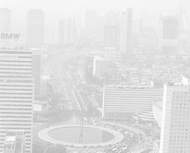Indonesia’s half-hearted pollution battle
Indonesia is severely polluted – forget environmental groups, even the Asian Development Bank and World Bank rank the country as one of the world’s worst.

In fact, it comes in third after Mexico and Thailand.
The deputy minister for the environment, Tanwir Mukawi Air, describe the air quality in the major cities as deteriorating fast.
He and others point to motor vehicles as the main cause.
In Jakarta alone, there are nearly one and a half million private vehicles and 15,000 public transport units operating on the streets, says the capital’s head of transportation agency, Rustam Effendi.
But emissions from industry and huge forest fire clearances are also seen as contributing factors.
Paying the price
Environmental concern during the development boom of the 80s was not top of President Suharto’s agenda.
But today’s Indonesians are paying an expensive price for this neglect.
 |
|
Vehicle emissions the main cause |
According to the latest research published by the Clean Air Project Swisscontact and the USEPA (United States Environmental Partnership), 82.4% of school age children in Indonesia have higher lead level in their blood than is recognised as safe.
“Lead attacks the nervous system and the damage is irreversible,” says Restiti Sekartini, programme officer of the Clean Air Project.
“For every 10 mg of Pb in a child’s bloodstream, there will be a 2.5 point drop in the child’s IQ,”
No public knowledge
But there is still no public awareness of the problem. Activists condemned President Megawati’s latest annual report for not mentioning environmental issues at all.
Mukawi, however, is quick to defend the government. “It is not true that the government is ignoring the problem … our Blue Sky programme aims to free Indonesia of leaded petrol by 2005.”
State Oil Company Pertamina PR spokesman Ridwan Nyak Biak confirms that unleaded gasoline was introduced to Jakarta in 2001, followed by neighbouring regions in West Java.
|
“I don’t think this will work as Pertamina has always been known for rampant corruption” Parmin, |
However, the secretary general of Indonesia’s car producers’ association FX Soeseno said the main problem car producers face was the inconsistency of petrol quality produced by Pertamina.
“Most of our cars are actually built to meet the Euro II standard, but without any consistency in fuel quality, no significant changes can be made,” he added.
Reacting to criticism
Stung by environmental criticism, President Megawati recently inaugurated 14 alternative fuel projects worth Rp. 2 trillion ($238 million) last 15 September.
The move has been met with strong scepticism among the public.
“I don’t think this will work as Pertamina has always been known for rampant corruption,” said Parmin, a Jakarta bus driver.
Other Indonesians are concerned the government is only looking for ways to extract more money out of them.
One example has been a public project to replace Indian-made three-wheeled taxis, known as bajaj, with locally-made more environmentally friendly vehicles.
The plan has so far received great resistance from the drivers, as the new vehicles will cost them twice the price of imported bajajs.
Little confidence
So although the head of Pertamina’s public relations says such difficulties can be overcome and that the state owned company will be able to produce a better quality of fuel, no one is expecting significant change soon.
Even foreign investors need persuading. The OPEC member country has been oil self-sufficient since 1975, but exports have been falling for years.
In 1997, the government exported 1.5 million barrels a day. Now it sells 1.2 million. The question seems to be how Jakarta will foot the bill for cleaning up its mess.